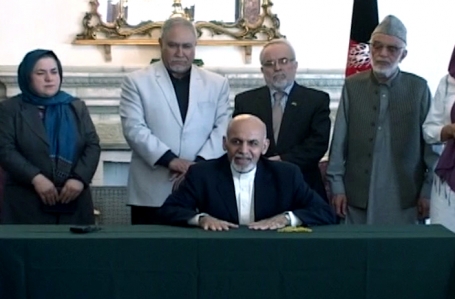
Newly elected President Ashraf Ghani Ahmadzai on Wednesday ordered a reinvestigation into the notorious Kabul Bank case, a move that could lend credibility to the claims that his government will be committed to combating Afghanistan’s rampant corruption.
In the decree, the president has ordered the Supreme Court to reopen the Kabul Bank case and undertake a new investigation. It has received praise from commentators who will, no doubt, have President Ghani under a microscope during his first few weeks, or months, in office.
The Kabul Bank faced bankruptcy three years ago, reportedly as a result of share holders withdrawing their money from the bank and transferring to Dubai. Although a few bank officials were punished, there remains widespread suspicion that there were more individuals involved who were never held to account.
“The Kabul Bank case must be thoroughly investigated and assessed, now it is the time for action and corruption must be combated aggressively,” President Ghani said on Wednesday.
The presidential decree regarding the case is summarized as follows: “The Supreme Court is assigned the task to reinvestigate the Kabul Bank crisis case lying in Kabul Appellate Court over the past year within one and half months and also undertake investigation into money laundering allegations tabled by the attorney of the case.”
The Attorney General and other institutions will be obligated to cooperate with the court in their investigation and "the ministry of finance is ordered to complete the proceedings of New Kabul Bank privatization documents and refer to the president for approval,” the order stated.
When the case first made headlines three years ago, it quickly became the preeminent example of how bad graft and malfeasance in the private and public sectors of Afghanistan had become. Of the total amount of $912 million that was embezzled from the bank, the fate of $800 million is still uncertain.
“The Kabul Bank bankruptcy case so far hasn’t been investigated thoroughly, we hope that the issue is investigated with seriousness this time,” said MP Abbas Ibrahim Zada, a member of Parliament’s Economic Commission.
In February 2013, a special court assigned to investigate the Kabul Bank case ended up imprisoning 21 people in connection to it. But many were unsatisfied by the ruling, which commentators said missed the biggest players in the scheme.
“This is a good move, previous investigations failed and we hope that this time the case will move forward,” said MP Abdul Qadir Zazai, the head of Parliament's Commission for World Affairs.
Most of all, it would seem, Afghans want to see those responsible held accountable for their crimes. “We hope that in the first step the law is implemented on the lawbreakers as the Prophet Mohammad (peace be upon him) also directs us to do,” religious scholar Dr. Ayaz Niazi said.
Afghanistan has been rated and is generally seen as one of the most corrupt nations in the world. In 2013, the Afghan judiciary was ranked the most corrupt in the world by Transparency International.
President Ghani emphasized his plans to fight graft in Afghanistan during his inauguration speech, and Wednesday’s decree marks the first tangible step his administration has taken to do so.



